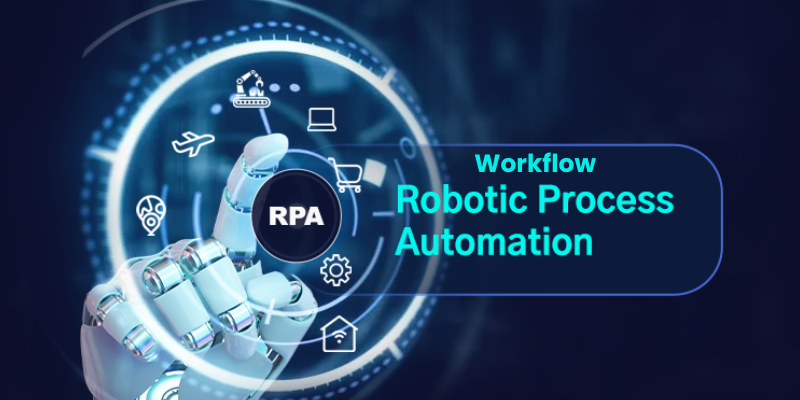In the ever-evolving landscape of technology, Robotic Process Automation (RPA) has emerged as a game-changer, revolutionizing how businesses handle repetitive tasks. One of the key features driving this transformation is Workflow Automation within RPA. In this blog post, we’ll delve into the concept of Workflow Automation in RPA, exploring its significance, benefits, and the role it plays in enhancing operational efficiency. Additionally, we’ll touch upon the relevance of specialized training, such as RPA Training In Bangalore.
Understanding Workflow Automation in RPA
Workflow Automation in RPA involves the use of software robots or “bots” to automate a sequence of tasks within a business process. These tasks are often rule-based, repetitive, and time-consuming, making them ideal candidates for automation. The primary goal of Workflow Automation is to streamline and optimize processes, reducing manual intervention and minimizing the risk of errors.
Bridging RPA and Mobile App Development
For those seeking a holistic approach to automation, Swift Training in Bangalore offers a comprehensive understanding of Swift, a programming language used in mobile app development. Integrating RPA with mobile app development skills provides professionals with a unique advantage in creating end-to-end automated solutions.
Mastering RPA and Beyond
As organizations increasingly recognize the value of RPA in enhancing operational efficiency, professionals with expertise in this field are in high demand. Specialized training, such as RPA Training in Chennai, equips individuals with the skills needed to design, implement, and manage automated workflows using RPA tools.
Key Components of Workflow Automation in RPA
Task Identification
RPA identifies repetitive and rule-based tasks within a business process that are suitable for automation. This can include data entry, form filling, report generation, and more.
Bot Deployment
Software robots, known as bots, are deployed to execute the identified tasks. These bots mimic the actions of a human operator, interacting with applications, systems, and databases to complete the assigned tasks.
Integration with Existing Systems
Workflow Automation in RPA seamlessly integrates with existing systems and applications, allowing bots to navigate through different platforms to gather and process information.
Exception Handling
RPA incorporates logic to handle exceptions and variations in processes. Bots can adapt to different scenarios, making them versatile in handling complex workflows.
Benefits of Workflow Automation in RPA
Increased Efficiency
By automating repetitive tasks, Workflow Automation in RPA significantly reduces processing time, allowing organizations to achieve higher efficiency and productivity.
Error Reduction
Automation minimizes the risk of human errors associated with manual data entry, ensuring accuracy and reliability in business processes.
Cost Savings
With Workflow Automation, organizations can achieve cost savings by optimizing resource utilization and freeing up human resources for more strategic and value-added tasks.
Scalability
RPA allows businesses to scale operations easily. Additional bots can be deployed to handle increased workloads without the need for significant infrastructure changes.
Enhanced Compliance
Automated workflows in RPA adhere to predefined rules and regulations, ensuring consistency and compliance with industry standards.
Elevating RPA Capabilities
Artificial Intelligence (AI) plays a synergistic role with RPA, enhancing its capabilities. An Artificial Intelligence Course in Chennai provides insights into AI technologies, empowering professionals to leverage machine learning and cognitive capabilities to further optimize and intelligentize automated workflows.
Navigating the Digital Landscape
In the era of digital transformation, organizations are leveraging RPA for streamlined marketing processes. Understanding digital platforms is crucial, equip professionals with the skills needed to navigate the digital landscape, ensuring effective integration of automated workflows in marketing strategies.
Transforming Operations with Workflow Automation in RPA
the integration of Workflow Automation in Robotic Process Automation (RPA) is a revolutionary catalyst, fundamentally transforming how businesses approach their operational workflows. The automation of repetitive tasks heralds a new era of efficiency, accuracy, and scalability for organizations. This transformative potential is best harnessed through specialized training programs like RPA Training in Chennai, which empowers professionals to unlock the full capabilities of RPA. By doing so, they become active contributors to the ongoing evolution of the digital business landscape.
Furthermore, individuals seeking to position themselves at the forefront of technological innovation should consider acquiring skills in Swift, Artificial Intelligence, and Digital Marketing Courses In Bangalore. These complementary skill sets not only enhance the versatility of professionals but also enable them to navigate the intricate intersection of automation and emerging technologies. In a rapidly evolving digital era, staying ahead requires a proactive approach to acquiring expertise in areas that are shaping the future of business processes. Through strategic training and skill development, professionals can ensure that they are not only keeping pace with but leading the way in leveraging automation for sustained success in the dynamic landscape of modern business.
Read more: RPA Interview Questions and Answers
